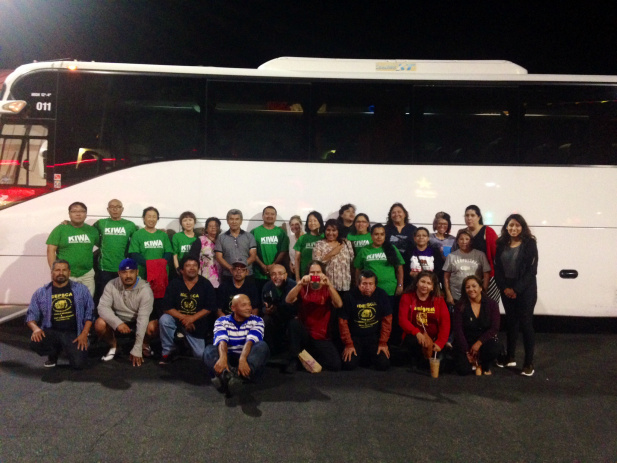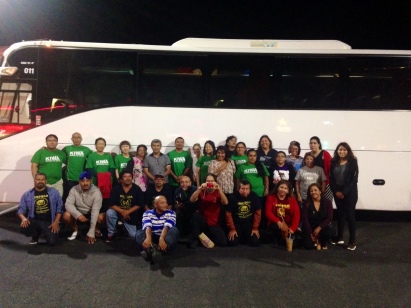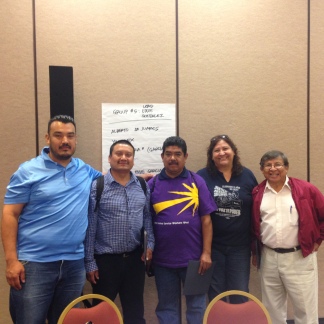Original Article written by Crystal Shaw in the Liberty Hill blog
UPDATE, JUNE 9, 2015: “I’m here to demand that the employer who hired us pay us. I already worked and completed the job but the employer took all the money including my pay. The employer did not consider the fact that I have rent, bills to pay or have a family to sustain. This abuse has to stop.”
Those were the courageous words spoken by Tomas C. Gonzalez, a day laborer and member of the Pomona Economic Opportunity Center, aLiberty Hill grantee, during a day of lobbying to successfully pass the Wage Theft Prevention Act, SB588. It was Tomas’ hard work along with many others that got the bill cleared through the California Senate and will now provide stronger mechanisms for enforcement of wage theft claims. SB588 now moves to State Assembly.
Interview with Eddie Gonzalez
“Please help us help ourselves.”
That one line, taken from a letter of support for the Wage Theft Prevention Act, California State Senate Bill 588, written by one of the many groups fighting passage speaks volumes. Liberty Hill Foundation also supports SB588—ending wage theft is one of the three goals of our Push for Power— and good news came this week when the bill did indeed pass the Senate 24-12!
The purpose of the Wage Theft Prevention Act according to its author, Senator Kevin de León, is just this: The basic promise of California’s labor laws—a fair day’s pay for an honest day’s work —is not being kept, despite the fact that we have good laws on the books. The Wage Theft Prevention law goes after the violators who are responsible for millions of dollars of wage theft violations each year and holds individuals responsible and accountable. The bill now begins to make its way through the State Assembly. This couldn’t have happened without the faithful and dedicated work of grassroots worker organizations including the Pomona Economic Opportunities Center(PEOC), whose members, many of them day laborers, traveled to Sacramento on Monday, June 1 for a day of lobbying just before the bill was voted on.
We spoke with Eddie Gonzalez, a PEOC Organizer, who traveled with two workers who were victims of wage theft themselves and went to tell their stories about how they were affected by this dirty practice. You hear a lot about how wage theft affects restaurant workers and car wash workers, but Eddie details why this bill is such an important piece of legislation in the fight against wage theft for day laborers, and what a day of lobbying really looks like. (For details on the bill’s provisions, read this background sheet.)
Who’s doing the groundwork on this bill with PEOC?
We’re part of a coalition called The Los Angeles Coalition Against Wage Theft with organizations like Koreatown Immigrant Workers Alliance (KIWA), and at this point too we have the Service Employees International Union (SEIU) who’s involved. We really do see this bill going through, although it’s not going to alleviate all the suffering but at least it will be one important step for the social justice movement.
What is SB588 and what will it change?
SB588 is going to improve the current labor laws, especially in enforcement. Many folks go out to work and unfortunately when they’re supposed to get paid some contractors just make any situation up and just not pay them for their day of work. That becomes a hardship on the worker because many of our workers have had situations where they have gone to labor commissions. They won the judgment but unfortunately they weren’t able to collect because wage theft is not criminal it’s only civil.
So we will be asking the Labor Commission to be able to get funded to have more investigators, because it seems like they’ve been overwhelmed. They’re not really out there as much as they should be.
Another thing that the Labor Commission wants to do is to be able to put a fine on wage theft offenders. They’re going to have to post a bond for $150,000. So would you rather be paying $150,000, or would you want to go ahead and pay the worker his $12,000 for the work he did for you?
How does SB588 align with the $15 Raise the Wage Campaign?
We’re ok with the $15 an hour for a lot of the restaurants, the fast food restaurants. It’s all good, we’re all supportive of that but what’s the point of having $15 an hour when you can’t even receive full wages? Fifteen dollars an hour is cool but we’re not able to see that, so Senator Kevin de León, he’s the actual author [of the bill], he’s been very progressive so we’re hoping that he’s going to get this bill passed.
How is wage theft affecting the PEOC workers?
As you know there’s no collective bargaining agreement for day laborers, so we’re not unionized right? Many folks just work independently so sometimes I guess that’s where a lot of the employees decide to take that abuse. And believe it or not, in the immigrant community, contractors/employers are very harsh. They always try to threaten the worker, call immigration. [It sometimes happens that] our workers are out for a week working and they never get a cent because the employer left. One of the things that was contradictory was that wage theft prevention proposals in the past were trying to go after home owners. In the beginning we didn’t think so highly of that because the home owners are the ones that are actually being scammed too, where they also do a contract with the contractor and sub-contractor. Then the contractors disappear with the money and the workers are still working on the property and the workers try to go after the homeowner. The one that ends up winning is the unethical contractor. So we’re just trying to have this bill really alleviate some of that stuff, hold these employers responsible.
Who will be going up to Sacramento for the day of lobbying?
I’m taking two workers. I’ve been fortunate to have negotiated a wage theft settlement of over $300 for each of them. I’m also taking a worker who has had two judgments in his favor totaling over $12,000 and I’ve been on that case since 2009. The only thing that we’ve ever seen is having the Labor Commission give us a “win.” But having this piece of paper saying you have a win doesn’t mean he’s going to be able to take that to the bank and exchange it for actual money and be able to pay bills. So the gentleman, Tomas, is very excited to go because he’s been affected by this, he and his family.
What’s the training like for a day of lobbying?
Along the way from L.A. to Sacramento at some point we’re sharing information, or splitting up and helping them with how they’re going to tell their story. We spend time making sure they understand how a bill gets through the stages to the senator’s office and signed. We explain all of those stages, from subcommittee, to the appropriations committee, which it just went through and it passed. And of course we all know that that’s the committee that decides how much the bill is going to cost the State of California.(Note: The passage of SB588 anticipates additional workload which would result in first-year’s costs of $2.6 million, with $2.2 million ongoing annually. This triggers another hearing after it goes through a budget hearing.)
The members will get a folder with materials, which they’ll be able to go through as we’re going to Sacramento. Then maybe the night before we’ll go out for some coffee and just start answering the workers’ questions or have them do some role playing. This way the following day we’ll also go to another orientation with the SEIU representatives in their office. We’ll speak on it again to reinforce what needs to be said when our members do talk to either the senators’ assistant or the senators themselves.
What is the energy like? Describe how it’s like when you’re going up there for a day of lobbying.
For me I think as an activist, an organizer, to be in this movement I always have to have hope knowing that things are going to change, probably not like the way we all are wanting them to, but just have that feeling that something’s going to turn out.
What do you want this bill to accomplish?
Basically what we are asking is just to have employers be accountable, to have the Labor Commission be more persistent when it comes to really going after the deadbeat employers. For instance, like the posting of a bond of $150,000, one of the things here is that there are monies involved. So I believe that we’re also fighting back with that same issue. The employers are trying to just rip off folks, get their profit, but do you think they’re honestly going to want to pay a post bond of $150,000 when all they had to do was pay the $12,000? How is that going to compare to $150,000? So I guess we’re hitting them where it hurts, their pockets.





